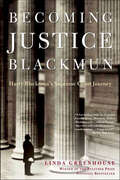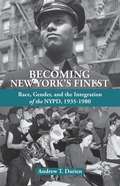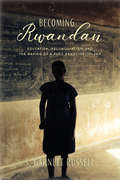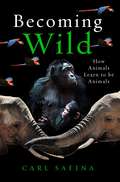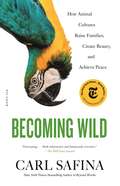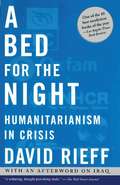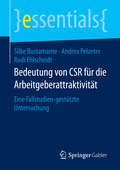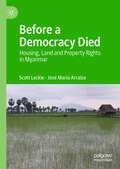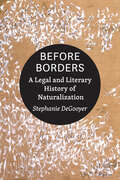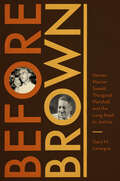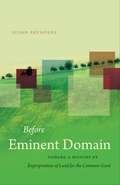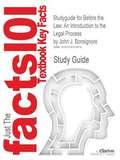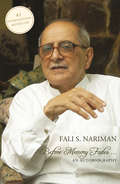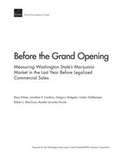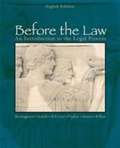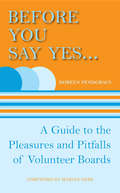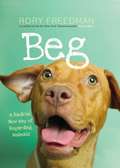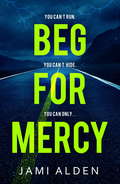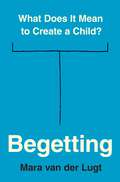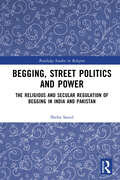- Table View
- List View
Becoming Justice Blackmun: Harry Blackmun's Supreme Court Journey
by Linda Greenhouse"A fascinating book. In clear and forceful prose, Becoming Justice Blackmun tells a judicial Horatio Alger story and a tale of a remarkable transformation . . . A page-turner."—The New York Times Book ReviewIn this acclaimed biography, Linda Greenhouse of The New York Times draws back the curtain on America's most private branch of government, the Supreme Court. Greenhouse was the first print reporter to have access to the extensive archives of Justice Harry A. Blackmun (1908–99), the man behind numerous landmark Supreme Court decisions, including Roe v. Wade.Through the lens of Blackmun's private and public papers, Greenhouse crafts a compelling portrait of a man who, from 1970 to 1994, ruled on such controversial issues as abortion, the death penalty, and sex discrimination yet never lost sight of the human beings behind the legal cases. Greenhouse also paints the arc of Blackmun's lifelong friendship with Chief Justice Warren E. Burger, revealing how political differences became personal, even for two of the country's most respected jurists.From America's preeminent Supreme Court reporter, this is a must-read for everyone who cares about the Court and its impact on our lives.
Becoming New York’s Finest
by Andrew T. DarienAfter excluding women and African Americans from its ranks for most of its history, the New York City Police Department undertook an aggressive campaign of integration following World War II. This is the first comprehensive account of how and why the NYPD came to see integration as a highly coveted political tool, indispensable to policing.
Becoming Rwandan: Education, Reconciliation, and the Making of a Post-Genocide Citizen (Genocide, Political Violence, Human Righ)
by S. Garnett RussellIn the aftermath of the genocide, the Rwandan government has attempted to use the education system in order to sustain peace and shape a new generation of Rwandans. Their hope is to create a generation focused on a unified and patriotic future rather than the ethnically divisive past. Yet, the government’s efforts to manipulate global models around citizenship, human rights, and reconciliation to serve its national goals have had mixed results, with new tensions emerging across social groups. Becoming Rwandan argues that although the Rwandan government utilizes global discourses in national policy documents, the way in which teachers and students engage with these global models distorts the intention of the government, resulting in unintended consequences and undermining a sustainable peace.
Becoming Wild: How Animals Learn to be Animals
by Carl SafinaWho are we? What do we value? How do we live here? Guided by parents, carers, teachers and siblings, we learn to answer these questions as we grow up. But it&’s not just us. Many animals must learn to answer them too. In Becoming Wild, Carl Safina reveals that culture, long thought exclusive to humankind, is abundant in the animal kingdom. Sperm whales in the Caribbean communicate through a system of clicks akin to Morse code, announcing which clan they belong to, which family and who they are individually. Among chimpanzees the obsession with male status may guarantee violence, even war, but they also have many ways to quell tensions. As Safina shows, the better we understand the animals with whom we share this planet, the less different from us they seem.
Becoming Wild: How Animal Cultures Raise Families, Create Beauty, and Achieve Peace
by Carl SafinaNew York Times bestselling author Carl Safina brings readers close to three non-human cultures—what they do, why they do it, and how life is for them.Some people insist that culture is strictly a human feat. What are they afraid of? This book looks into three cultures of other-than-human beings in some of Earth’s remaining wild places. It shows how if you’re a sperm whale, a scarlet macaw, or a chimpanzee, you too experience your life with the understanding that you are an individual in a particular community. You too are who you are not by genes alone; your culture is a second form of inheritance. You receive it from thousands of individuals, from pools of knowledge passing through generations like an eternal torch. You too may raise young, know beauty, or struggle to negotiate a peace. And your culture, too, changes and evolves. The light of knowledge needs adjusting as situations change, so a capacity for learning, especially social learning, allows behaviors to adjust, to change much faster than genes alone could adapt. Becoming Wild offers a glimpse into cultures among non-human animals through looks at the lives of individuals in different present-day animal societies. By showing how others teach and learn, Safina offers a fresh understanding of what is constantly going on beyond humanity. With reporting from deep in nature, alongside individual creatures in their free-living communities, this book offers a very privileged glimpse behind the curtain of life on Earth, and helps inform the answer to that most urgent of questions: Who are we here with?
A Bed for the Night: Humanitarianism in Crisis
by David RieffTimely and controversial, A Bed for the Night reveals how humanitarian organizations trying to bring relief in an ever more violent and dangerous world are often betrayed and misused, and have increasingly lost sight of their purpose.Humanitarian relief workers, writes David Rieff, are the last of the just. And in the Bosnias, the Rwandas, and the Afghanistans of this world, humanitarianism remains the vocation of helping people when they most desperately need help, when they have lost or stand at risk of losing everything they have, including their lives.Although humanitarianism's accomplishments have been tremendous, including saving countless lives, the lesson of the past ten years of civil wars and ethnic cleansing is that it can do only so much to alleviate suffering. Aid workers have discovered that while trying to do good, their efforts may also cause harm.Drawing on firsthand reporting from hot war zones around the world -- Bosnia, Rwanda, Congo, Kosovo, Sudan, and most recently Afghanistan -- Rieff describes how the International Committee of the Red Cross, Doctors Without Borders, the International Rescue Committee, CARE, Oxfam, and other humanitarian organizations have moved from their founding principle of political neutrality, which gave them access to victims of wars, to encouraging the international community to take action to stop civil wars and ethnic cleansing. This advocacy has come at a high price. By calling for intervention -- whether by the United Nations or by "coalitions of the willing" -- humanitarian organizations risk being seen as taking sides in a conflict and thus jeopardizing their access to victims. And by overreaching, the humanitarian movement has allowed itself to be hijacked by the major powers, at times becoming a fig leaf for actions those powers wish to take for their own interests, or for the major powers' inaction. Rieff concludes that if humanitarian organizations are to do what they do best -- alleviate suffering -- they must reclaim their independence.Except for relief workers themselves, no one has looked at humanitarian action as seriously or as unflinchingly, or has had such unparalleled access to its inner workings, as Rieff, who has traveled and lived with aid workers over many years and four continents.A cogent, hard-hitting report from the front lines, A Bed for the Night shows what international aid organizations must do if they are to continue to care for the victims of humanitarian disasters.
A Bed for the Night
by David RieffTimely and controversial, A Bed for the Night reveals how humanitarian organizations trying to bring relief in an ever more violent and dangerous world are often betrayed and misused, and have increasingly lost sight of their purpose.Humanitarian relief workers, writes David Rieff, are the last of the just. And in the Bosnias, the Rwandas, and the Afghanistans of this world, humanitarianism remains the vocation of helping people when they most desperately need help, when they have lost or stand at risk of losing everything they have, including their lives.Although humanitarianism's accomplishments have been tremendous, including saving countless lives, the lesson of the past ten years of civil wars and ethnic cleansing is that it can do only so much to alleviate suffering. Aid workers have discovered that while trying to do good, their efforts may also cause harm.Drawing on firsthand reporting from hot war zones around the world -- Bosnia, Rwanda, Congo, Kosovo, Sudan, and most recently Afghanistan -- Rieff describes how the International Committee of the Red Cross, Doctors Without Borders, the International Rescue Committee, CARE, Oxfam, and other humanitarian organizations have moved from their founding principle of political neutrality, which gave them access to victims of wars, to encouraging the international community to take action to stop civil wars and ethnic cleansing. This advocacy has come at a high price. By calling for intervention -- whether by the United Nations or by "coalitions of the willing" -- humanitarian organizations risk being seen as taking sides in a conflict and thus jeopardizing their access to victims. And by overreaching, the humanitarian movement has allowed itself to be hijacked by the major powers, at times becoming a fig leaf for actions those powers wish to take for their own interests, or for the major powers' inaction. Rieff concludes that if humanitarian organizations are to do what they do best -- alleviate suffering -- they must reclaim their independence.Except for relief workers themselves, no one has looked at humanitarian action as seriously or as unflinchingly, or has had such unparalleled access to its inner workings, as Rieff, who has traveled and lived with aid workers over many years and four continents.A cogent, hard-hitting report from the front lines, A Bed for the Night shows what international aid organizations must do if they are to continue to care for the victims of humanitarian disasters.
Bedeutung von CSR für die Arbeitgeberattraktivität: Eine Fallstudien-gestützte Untersuchung (essentials)
by Andrea Pelzeter Silke Bustamante Rudi EhlscheidtDieses essential beschreibt, ob und wie verschiedene Aspekte der Corporate Social Responsibility die Arbeitgeberattraktivität erhöhen und für Rekrutierung und Mitarbeiterbindung genutzt werden können. Es werden theoretische und empirische Ergebnisse zu den Präferenzstrukturen von Studierenden und Mitarbeitern aufgezeigt. Im Rahmen von Fallstudien werden Zusammenhänge zwischen Arbeitnehmerpräferenzen, CSR-Leistung und CSR-bezogener Kommunikation näher analysiert.
The Bedroom and the State: The Changing Practices and Politics of Contraception and Abortion in Canada, 1880-1997 (2nd edition)
by Angus Mclaren Arlene T. MclarenThe decline of the birth rate is arguably the most important social change of the twentieth century in Canada. The Bedroom and the State, first published in 1986, examines the social, cultural, and technological reasons for this decline and answers such questions as:* What forms of contraception were used prior to the Pill?* How widespread and dangerous has abortion been?* Why were so many feminists, socialists, ministers, and doctors initially opposed to birth control?* Who were its first proponents in Canada?* Why has Quebec's birth rate fallen so precipitiously?* Why was contraception illegal until 1969?The Bedroom and the State is recognized as a landmark history of how Canadian men and women sought to limit births and how public figures sought to turn such concern to political purposes. In this second edition the authors have updated their conclusion and added a new chapter to cover denouementof the pro-choice/pro-life debate in Canada, to detail recent court challenges to Canadian law, and to describe recent developments in reproductive technologies and their significance for present and future generations.This excellent work reveals that the control of fertility has been a crucial factor in the history of the shifting power relationships of the sexes and the classes.
Before a Democracy Died: Housing, Land and Property Rights in Myanmar
by Scott Leckie José María ArraizaThis volume is a collection of chapters based on work within Myanmar by the authors between 2009 and 2021 while working to improve housing, land and property rights for the population. Despite the extensive application and political uptake of their work throughout the country during the brief democratic reform period of 2011-2021, and measurable progress being made, their work and that of the entire HLP community was brought to a sudden stop following the unexpected military coup in February 2021. Many of those with whom the authors worked closely on various HLP matters are no longer able to work safely on these issues in Myanmar. Others have fled the country and are now refugees, while others continue to face daily persecution and harassment by the military regime. These texts will be of great interest to scholars and activists in the region.
Before Borders: A Legal and Literary History of Naturalization
by Stephanie DeGooyerAn ambitious revisionist history of naturalization as a creative mechanism for national expansion.Before borders determined who belonged in a country and who did not, lawyers and judges devised a legal fiction called naturalization to bypass the idea of feudal allegiance and integrate new subjects into their nations. At the same time, writers of prose fiction were attempting to undo centuries of rules about who could—and who could not—be a subject of literature. In Before Borders, Stephanie DeGooyer reconstructs how prose and legal fictions came together in the eighteenth century to dramatically reimagine national belonging through naturalization. The bureaucratic procedure of naturalization today was once a radically fictional way to create new citizens and literary subjects.Through early modern court proceedings, the philosophy of John Locke, and the novels of Daniel Defoe, Laurence Sterne, Maria Edgeworth, and Mary Shelley, DeGooyer follows how naturalization evolved in England against the backdrop of imperial expansion. Political and philosophical proponents of naturalization argued that granting foreigners full political and civil rights would not only attract newcomers but also better attach them to English soil. However, it would take a new literary form—the novel—to fully realize this liberal vision of immigration. Together, these experiments in law and literature laid the groundwork for an alternative vision of subjecthood in England and its territories.Reading eighteenth-century legal and prose fiction, DeGooyer draws attention to an overlooked period of immigration history and compels readers to reconsider the creative potential of naturalization.
Before Brown: Heman Marion Sweatt, Thurgood Marshall, and the Long Road to Justice (Jess and Betty Jo Hay Series)
by Gary M. Lavergne&“Like Texas&’s founding fathers, Sweatt fearlessly faced evil, and made Texas a better place. His story is our story, and Gary Lavergne tells it well.&” –Paul Begala, political contributor, CNN Winner of the Coral Horton Tullis Prize for Best Book of Texas History by the Texas State Historical Association Winner of the Carr P. Collins Award for Best Work of Non-fiction by the Texas Institute of Letters On February 26, 1946, an African American from Houston applied for admission to the University of Texas School of Law. Although he met all of the school&’s academic qualifications, Heman Marion Sweatt was denied admission because he was black. He challenged the university&’s decision in court, and the resulting case, Sweatt v. Painter, went to the U.S. Supreme Court, which ruled in Sweatt&’s favor. In this engrossing, well-researched book, Gary M. Lavergne tells the fascinating story of Heman Sweatt&’s struggle for justice and how it became a milestone for the civil rights movement. He reveals that Sweatt was a central player in a master plan conceived by the National Association for the Advancement of Colored People (NAACP) for ending racial segregation in the United States. Lavergne masterfully describes how the NAACP used the Sweatt case to practically invalidate the &“separate but equal&” doctrine that had undergirded segregated education for decades. He also shows how the Sweatt case advanced the career of Thurgood Marshall, whose advocacy of Sweatt taught him valuable lessons that he used to win the Brown v. Board of Education case in 1954 and ultimately led to his becoming the first black Associate Justice of the Supreme Court.
Before Brown: Heman Marion Sweatt, Thurgood Marshall, and the Long Road to Justice (Jess and Betty Jo Hay Series)
by Gary M. Lavergne&“Like Texas&’s founding fathers, Sweatt fearlessly faced evil, and made Texas a better place. His story is our story, and Gary Lavergne tells it well.&” –Paul Begala, political contributor, CNN Winner of the Coral Horton Tullis Prize for Best Book of Texas History by the Texas State Historical Association Winner of the Carr P. Collins Award for Best Work of Non-fiction by the Texas Institute of Letters On February 26, 1946, an African American from Houston applied for admission to the University of Texas School of Law. Although he met all of the school&’s academic qualifications, Heman Marion Sweatt was denied admission because he was black. He challenged the university&’s decision in court, and the resulting case, Sweatt v. Painter, went to the U.S. Supreme Court, which ruled in Sweatt&’s favor. In this engrossing, well-researched book, Gary M. Lavergne tells the fascinating story of Heman Sweatt&’s struggle for justice and how it became a milestone for the civil rights movement. He reveals that Sweatt was a central player in a master plan conceived by the National Association for the Advancement of Colored People (NAACP) for ending racial segregation in the United States. Lavergne masterfully describes how the NAACP used the Sweatt case to practically invalidate the &“separate but equal&” doctrine that had undergirded segregated education for decades. He also shows how the Sweatt case advanced the career of Thurgood Marshall, whose advocacy of Sweatt taught him valuable lessons that he used to win the Brown v. Board of Education case in 1954 and ultimately led to his becoming the first black Associate Justice of the Supreme Court.
Before Eminent Domain
by Susan ReynoldsIn this concise history of expropriation of land for the common good in Europe and North America from medieval times to 1800, Susan Reynolds contextualizes the history of an important legal doctrine regarding the relationship between government and the institution of private property. Before Eminent Domain concentrates on western Europe and the English colonies in America. As Reynolds argues, expropriation was a common legal practice in many societies in which individuals had rights to land. It was generally accepted that land could be taken from them, with compensation, when the community, however defined, needed it. She cites examples of the practice since the early Middle Ages in England, France, Germany, Italy, and Spain, and from the seventeenth century in America.Reynolds concludes with a discussion of past and present ideas and assumptions about community, individual rights, and individual property that underlie the practice of expropriation but have been largely ignored by historians of both political and legal thought.
Before The Law: An Introduction to the Legal Process
by John J. Bonsignore Stephen Arons Ethan Katsh Peter Derrico Ronald PipkinNever HIGHLIGHT a Book Again Includes all testable terms, concepts, persons, places, and events. Cram101 Just the FACTS101 studyguides gives all of the outlines, highlights, and quizzes for your textbook with optional online comprehensive practice tests. Only Cram101 is Textbook Specific. Accompanies: 9780618503452.
Before Memory Fades: An Autobiography
by Fali S. NarimanBefore Memory Fades by Fali S. Nariman is a revelatory, comprehensive and perceptive autobiography – candid, compelling and authoritative.Internationally admired and respected, Fali S. Nariman is a senior advocate of the Supreme Court of India. He began his career at the Bombay High Court in November 1950, and has since been active in the legal profession. Over the years, he has held several prestigious posts at both the national and international levels. He became a Member of Parliament (Rajya Sabha) in November 1999. He is the recipient of the Padma Bhushan (1991) and the Padma Vibhushan (2007). Starting with his formative years, when he had the good fortune to interact with many eminent judges and advocates, Fali S. Nariman moves on to deal with a wide variety of important subjects, such as, the sanctity of the Indian Constitution and attempts to tamper with it. crucial cases that have made a decisive impact on the nation, especially on the interpretation of the law, the relationship between the political class and the judiciary, the cancer of corruption and how to combat this menace, the author outlines measures to restore the now-low credibility of the legal profession, he also delineates his role in several high-profile cases. In recognition of his track record, the Government of India nominated him to the Rajya Sabha. He describes the highlights of his tenure there. Both members of the legal profession and the lay reader will find the contents informative and useful.
Before the Best Interests of the Child
by Anna Freund Albert J. Solnit Joseph GoldsteinA lawyer and two child psychologists conclude which circumstances are reasonable grounds for the state intervening between parent and child
Before the Grand Opening: Measuring Washington State's Marijuana Market in the Last Year Before Legalized Commercial Sales
by Beau Kilmer Jonathan P. Caulkins Gregory Midgette Linden Dahlkemper Robert J. Maccoun Rosalie Liccardo PaculaBefore the Grand Opening: Measuring Washington State's Marijuana Market in the Last Year Before Legalized Commercial Sales
Before the Law: The Complete Text of Préjugés (Univocal)
by Jacques DerridaThinking judgment in relation to the work of Jean-François Lyotard &“How to judge—Jean-François Lyotard?&” It is from this initial question that one of France&’s most heralded philosophers of the twentieth century begins his essay on the origin of the law, of judgment, and the work of his colleague Jean-François Lyotard. If Jacques Derrida begins with the term préjugés, it is in part because of its impossibility to be rendered properly in other languages and also contain all its meanings: to pre-judge, to judge before judging, to hold prejudices, to know &“how to judge,&” and more still, to be already prejudged oneself. Striving to contain that which comes before the law, that is in front of the law and also prior to it, how to judge Jean-François Lyotard then becomes perhaps a beneficial attempt for Derrida to explore humanity&’s rapport with judgment, origins, and naming. For how does one come to judge the author of the Differend? How does one abstain from judgment to accept the term préjugés as suspending judgment and at once as taking into account the impossibility of speaking before the law, prior to naming or judging? If this task indeed seems insurmountable, it is the site where Lyotard&’s work itself is played out. Hence this sincere and intriguing essay presented by Jacques Derrida, published here for the first time in English.
Before the Law: An Introduction to the Legal Process
by Ethan Katsh John Bonsignore Ronald M. Pipkin Peter D'Errico Stephen AronsBefore the Law promotes an interdisciplinary approach for introducing students to the purpose and practice of law in our society. Excerpts from recent and classic court cases, as well as material on trends in legal studies come from a range of legal sources, including court opinions; sociological, psychological, and anthropological analyses; historical and philosophical approaches; and literary reflections. Readings cover such current topics as online dispute resolution and protection of personal and property rights in cyberspace; gay marriage; and post-9/11 legislation for fighting terrorism.
Before You Say Yes ...: A Guide to the Pleasures and Pitfalls of Volunteer Boards
by Doreen PendgracsDoreen Pendgracs has sat on various boards of directors for the past twenty-five years. During that time, she has gleaned valuable information that she shares in an easy-to-understand, conversational style for novices and seasoned members alike. Whether you’re asked to sit on a trade union board, a non-profit board for a community group or church, a business-focused board of an association or chamber of commerce, or the board of a charitable organization, Before You Say Yes … gives you the inside scoop on what questions to ask and what you need to do before you take the plunge. Ms. Pendgracs leads the reader through the intricacies of management style, board etiquette and responsibilities, Robert’s Rules of Order, directors’ and officers’ insurance, and financial obligations and compensation. You’ll also discover what happens in the case of a lawsuit or how to implement a disaster plan, how to welcome new board members and deal with difficult people, and what benefits board membership can bring to your personal life and career.
Beg: A Radical New Way of Regarding Animals
by Rory FreedmanRory Freedman explains her profound love for her dogs and encourages the world to embrace the importance of pets.
Beg For Mercy: Dead Wrong Book 1 (Dead Wrong)
by Jami AldenJami Alden's Beg For Mercy is a sizzling, suspenseful tale, perfect for fans of Melinda Leigh, Kendra Elliot, Karen Rose and Laura Griffin.Megan Flynn thought she was falling in love with Cole Williams. That is until he arrested her brother - the only family she has left - for a murder she knows he couldn't have possibly committed. Now, with her heart broken and her brother's life hanging in the balance, Megan will risk everything to prove his innocence. Even if that means throwing herself into the path of a sadistic killer with a hauntingly familiar MO. When she insinuates herself into the most shockingly brutal case Cole has ever worked, he can't stand idly by. Plunged into a secret world where the city's elite indulge their darkest desires, Cole will do whatever it takes save the woman he loves and bring down the madman who has made Megan his most coveted prey.Don't miss more edge-of-the-seat suspense from Jami Alden with her sexy, thrilling novels Hide From Evil, Run From Fear and Guilty As Sin.
Begetting: What Does It Mean to Create a Child?
by Mara van der LugtAn investigation of what it means to have children—morally, philosophically and emotionally&“Do you want to have children?&” is a question we routinely ask each other. But what does it mean to create a child? Is this decision always justified? Does anyone really have the moral right to create another person? In Begetting, Mara van der Lugt attempts to fill in the moral background of procreation. Drawing on both philosophy and popular culture, van der Lugt does not provide a definitive answer on the morality of having a child; instead, she helps us find the right questions to ask.Most of the time, when we talk about whether to have children, what we are really talking about is whether we want to have children. Van der Lugt shows why this is not enough. To consider having children, she argues, is to interrogate our own responsibility and commitments, morally and philosophically and also personally. What does it mean to bring a new creature into the world, to decide to perform an act of creation? What does it mean to make the decision that life is worth living on behalf of a person who cannot be consulted? These questions are part of a conversation we should have started long ago. Van der Lugt does not ignore the problematic aspects of procreation—ethical, environmental and otherwise. But she also acknowledges the depth and complexity of the intensely human desire to have a child of our own blood and our own making.
Begging, Street Politics and Power: The Religious and Secular Regulation of Begging in India and Pakistan (Routledge Studies in Religion)
by Sheba SaeedBegging, Street Politics and Power explores the complex phenomenon of begging in the context of two different religions and societies in South Asia. Focusing on India and Pakistan, the book provides an in-depth examination of the religious and secular laws regulating begging along with discussion of the power dynamics involved. Drawing on textual analysis and qualitative field research, the chapters consider the notion of charity within Hinduism and Islam, the transaction of giving and receiving, and the political structures at play in the locations studied. The book engages with the conflicting compassionate and criminal sides of begging and reveals some of the commonalities and differences in religion and society within South Asia. It will be of interest to scholars working across the fields of religious studies, social science, law and Asian studies.
